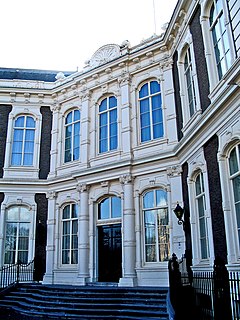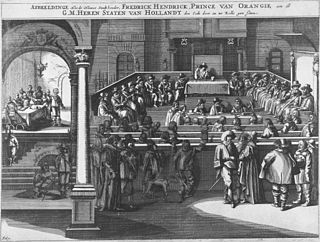 W
WIn Dutch politics the bordes scene (Dutch:bordesscène) is the official presentation of a new cabinet with the monarch on the "bordes" of the royal palace.
 W
WThe boroughs of Amsterdam are the eight principal subdivisions of the municipality of Amsterdam, Netherlands. Each borough is governed by a directly elected district committee (bestuurscommissie). The first Amsterdam boroughs were created in 1981, with other boroughs created in later years. The last area to be granted the status of borough was Amsterdam-Centrum (2002). The existing system of eight boroughs, covering all parts of Amsterdam, is the result of a major borough reform in 2010. The current boroughs have populations of around 80,000 to 140,000, which is equivalent to an average-sized municipality in the Netherlands.
 W
WThe Constitution for the Kingdom of the Netherlands is one of two fundamental documents governing the Kingdom of the Netherlands as well as the fundamental law of the European territory of the Kingdom of the Netherlands. It is generally seen as directly derived from the one issued in 1815, constituting a constitutional monarchy; it is the third oldest constitution still in use worldwide.
 W
WThe Constitutional Reform of 1848 laid the basis for the present system of parliamentary democracy in the Netherlands. It is often described as the original version of the Dutch Constitution that is still in force today. Under pressure from the Revolutions of 1848 in surrounding countries, King William II agreed to several demands of the liberal parliamentary opposition. The House of Representatives obtained much more influence, and was now directly elected. The reform was in some sense a peaceful revolution, in which liberal politician Johan Rudolph Thorbecke and King William II played important roles.
 W
WThe Council of State is a constitutionally established advisory body in the Netherlands to the government and States General that officially consists of members of the royal family and Crown-appointed members generally having political, commercial, diplomatic or military experience. It was founded in 1531, making it one of the world's oldest still-functioning state organisations.
 W
WThe deputy prime minister of the Netherlands is the official deputy of the head of government of the Netherlands. In the absence of the prime minister of the Netherlands the deputy prime minister takes over his functions, such as chairing the Cabinet of the Netherlands and the Council of Ministers of the Netherlands. Conventionally, all of the junior partners in the coalition get one deputy, and the deputies are ranked according to the size of their respective parties. The incumbent deputy prime ministers are Hugo de Jonge, Kajsa Ollongren and Carola Schouten.
 W
WThe House of Representatives is the lower house of the bicameral parliament of the Netherlands, the States General, the other one being the Senate. It has 150 seats, which are filled through elections using a party-list proportional representation. Generally, the house is located in the Binnenhof in The Hague, however, it has temporarily moved to the former building of the Ministry of Foreign Affairs at Bezuidenhoutseweg 67 in the Hague while the Binnenhof is being renovated.
 W
WA Minister Plenipotentiary represents the government of one of the Caribbean constituent countries as part of the Kingdom of the Netherlands. The minister is part of the government of that country, but resides in the Netherlands, where they are part of the Council of Ministers of the Kingdom of the Netherlands.
 W
WIn the Netherlands, the municipal executive is the executive board of a municipality. It plays a central role in municipal politics in the Netherlands, similar to the communal college in Belgium. It consists of the mayor and the members of the municipal executive (aldermen).
 W
WThe prime minister of the Netherlands is the head of the executive branch of the Government of the Netherlands. Although the monarch is the de jure head of government, the prime minister de facto occupies this role as the officeholder chairs the Council of Ministers and coordinates its policy with the rest of the cabinet. The current prime minister has been Mark Rutte since 14 October 2010, who serves in a demissionary capacity since his resignation on 15 January 2021.
 W
WPrinsjesdag is the day on which the reigning monarch of the Netherlands addresses a joint session of the States-General of the Netherlands to give the speech from the throne. This speech sets out the main features of government policy for the coming parliamentary session.
 W
WThe provincial council, also known as the States Provincial, is the provincial parliament and legislative assembly in each of the provinces of the Netherlands. It is elected for each province simultaneously once every four years and has the responsibility for matters of sub-national or regional importance. The number of seats in a provincial council is proportional to its population.
 W
WThe provincial executive is the executive branch of government of a province in the Netherlands. It is the equivalent of the municipal executive at the provincial level. The provincial executive consists of the King's Commissioner (chair) and three to seven deputies.
 W
WThe Ridderzaal is the main building of the 13th-century inner square of the former castle of the counts of Holland called Binnenhof at the address Binnenhof 11 in The Hague, Netherlands. It is used for the annual state opening of Parliament on Prinsjesdag, when the Dutch monarch drives to Parliament in the Golden Coach and delivers the speech from the throne. It is also used for official royal receptions, and inter-parliamentary conferences.
 W
WThe Senate is the upper house of the States General, the legislature of the Netherlands. Its 75 members are elected on lists by the members of the twelve States-Provincial and three Caribbean electoral colleges for the Senate every four years, within three months of the provincial elections. All provinces and colleges have different electoral weight depending on their population.
 W
WThe Social and Economic Council is a major economic advisory council to the cabinet of the Netherlands. Formally it heads a system of sector-based regulatory organisations. It represents the social partners trade unions and employers' organisations. It forms the core organisation of the corporatist and social market economy known as the polder model and the main platform for social dialogue.
 W
WThe States General of the Netherlands is the bicameral legislature of the Netherlands consisting of the Senate and the House of Representatives. Both chambers meet at the Binnenhof in The Hague.
 W
WThe States of Holland and West Frisia were the representation of the two Estates (standen) to the court of the Count of Holland. After the United Provinces were formed — and there no longer was a count, but only his "lieutenant" — they continued to function as the government of the County of Holland.